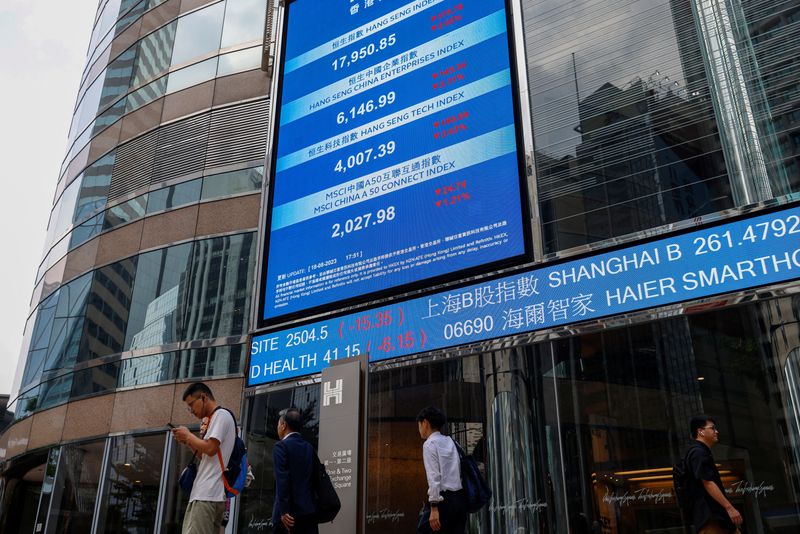By Herbert Lash and Alun John
NEW YORK/LONDON (Reuters) -The dollar eased and a gauge of global stock performance fell on Tuesday as fading optimism that central banks will soon cut interest rates dampened sentiment, leaving key pan-European and Japanese stock indices just below their all-time highs.
Europe's broad STOXX 600 benchmark and Japan's Nikkei remain about 1% off their peaks, while a weeks-long rally on Wall Street stalled, despite stellar results from Walmart (NYSE:WMT) that lifted its shares to a record high.
Hotter-than-expected U.S. inflation data last week pushed back expectations for an imminent start to the Federal Reserve's easing cycle. A rate cut is now expected in June, according to a slim majority of economists polled by Reuters, who also flagged risk of a further delay in the first cut.
The call for further deflation has depended on below-trend economic growth, but the structural foundation for that outlook is wrong as there is little slack in the U.S. economy, said Phillip Colmar, global strategist at MRB Partners in New York.
"The whole Goldilocks soft-landing scenario was also wrong," he said. "We like Goldilocks. But our experience is she doesn't visit for very long and the risk to the Goldilocks scenario was that we weren't going to have a soft landing with enough slack in the economy building up to bring down inflation."
The dollar index, a measure of the U.S. currency against six others, fell 0.24%, while MSCI's gauge of stocks across the globe shed 0.35%.
The STOXX 600 index closed down 0.10% as markets ignored European Central Bank data that showed the annual growth in negotiated wages across the euro area slowing to 4.5% in the fourth quarter last year, down from 4.7% in the prior period.
The ECB has pointed to wages as the biggest risk to its 1-1/2 year crusade against inflation. An ECB analysis of salary agreements indicates wage growth will remain high this year, while the number of companies that expect price increases is rising again, Commerzbank (ETR:CBKG)'s senior economist Marco Wagner said in a note.
The tech-heavy Nasdaq led losses on Wall Street as chipmaker Nvidia (NASDAQ:NVDA), which reports results after markets close on Wednesday, fell 4.4%. On Wall Street, the Dow Jones Industrial Average fell 0.17%, the S&P 500 lost 0.60% and the Nasdaq Composite dropped 0.92%. The response to the interest rate outlook from asset classes other than bonds has been muted so far, but U.S. economic growth compared to elsewhere will likely change the lock-step move for central bank expectations, said Marvin Loh, senior global macro strategist at State Street (NYSE:STT) in Boston.
Since mid-January the market has reduced rate cut expectations by 60 basis points for the Fed, the same for the Bank of Canada, 37 basis points for the ECB and 57 basis points for the Bank of England, he said.
"This change in the U.S. rates market is an economy that is performing in a way that we're not seeing in a lot of the other developed markets. Eventually you're going have to start seeing more separation," Loh said.
The two-year Treasury yield, which reflects interest rate expectations, fell 4.8 basis points to 4.608%, while the yield on the benchmark 10-year note was down 2.4 basis points at 4.271%.
Germany's 10-year Bund yield, which moves inversely to its price, was down 0.7 basis points at 2.378%, while the euro was 0.29% higher at $1.0811.
Germany's rate-sensitive two-year yield has risen about 40 bps year to date.
CHINESE RATE CUT
China's five-year loan prime rate was lowered by 25 basis points to 3.95%, bigger than the five to 15 bp cuts forecast by economists. The one-year rate was left at 3.45%, helping blue chips to finish the day up 0.2%, after an earlier fall, and Hong Kong's Hang Seng index to rise 0.6%. [.SS]
The yuan touched its lowest in three months in early trade before steadying at 7.1925. [CNY/]
The dollar weakened after China cut rates in a bid to prop up its struggling property market, raising hopes of additional stimulus that would boost global growth.
The yen gained but stayed below the 150.88 per dollar level reached last Monday, its weakest in 11 weeks, as investors focus on whether renewed weakness in the Japanese currency is likely to prompt intervention.
Oil prices fell more than 1%, with worries about global demand offsetting price support from the Israel-Hamas conflict.
Brent futures settled down $1.22 to $82.34a barrel. The six-month spread for Brent onTuesday was at its highest since October, a sign of a tightermarket.
U.S. West Texas Intermediate (WTI) crude for March delivery, which expires Tuesday, settled down $1.01 at $78.18 a barrel. The more actively traded April WTI contract settled down $1.30 at $77.04 a barrel.

Gold prices climbed to their highest level in more than a week as the dollar retreated.
U.S. gold futures settled 0.8% higher at$2,039.80 an ounce.